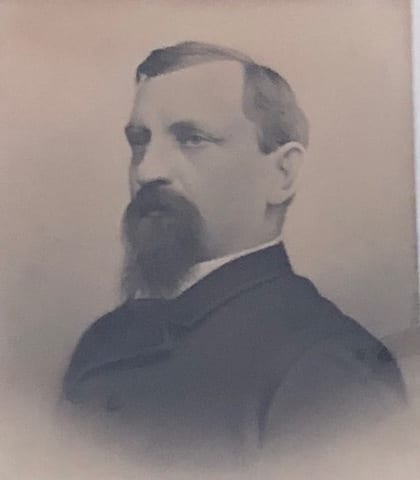From its traditional livestock competitions and agricultural exhibits to its unique tenting encampment component, the beloved 144-year-old Centre County Grange Fair is all the result of the vision of one man: Leonard Rhone, a local farmer born and raised in Potter Township.
Considering the $2.9 million the fair is expected to pump directly into the local economy during its nine-day run this year, Rhone’s lasting impact on the community cannot be overstated, but it does not end there. Rhone played a vital role in the agricultural and economic development of the county, the state and even the nation, and is a large reason the Pennsylvania State University is located in Centre County today.
Born in 1838 on the Rhone homestead between Boalsburg and Centre Hall, Rhone took over the family farm in 1865, just two years before the national Grange, a fraternal organization of farmers, was established. According to longtime Grange Fair committee member and archivist LeDon Young, Rhone quickly recognized the benefits the Grange could provide.
“He believed in strength through numbers. Farm life was very isolating, and the Grange organization allowed farmers to come together,” Young said. “Rhone was a grand organizer. He organized Progress Grange (in Centre Hall) in February of 1874, and founded six more Granges by September.”
That same year, Rhone organized the first “pic-nik” to introduce people to Grange and to bring farmers together for purposes of education and socialization. This became an annual event, often held on the top of Centre Hall Mountain, and because many families were traveling from outside of the area to attend, they would camp overnight. To make this easier for all participants, Rhone rented tents from the National Guard, Young said — a precursor to the tenting tradition that lives on today.
In 1890, under Rhone’s leadership, the local Granges decided to purchase land near the railroad as a permanent location for the annual “pic-nik” and encampment event. This became the nucleus of what is now the largest fairground in the state of Pennsylvania: Grange Park, the current home of the Centre County Grange Fair.
Rhone served as master of the Pennsylvania Grange organization for 18 years, and served on the National Grange executive committee for 10 years, Young said. He also served in the Pennsylvania State Legislature for two years. The tenets of the Grange organization reflected many of Rhone’s ideals as an advocate of equality for women, education and technology in agriculture.
Rhone and the Grange were successful in advocating for the following:
■ Rural Free Delivery
Rhone appeared before Congress and was instrumental in bringing this service to farmers everywhere.
“Rural free mail delivery was to its day what the Internet is to us,” Young said. “Now farmers could borrow library books and subscribe to newspapers, which would come to them through the mail. … With Rural Free Delivery and the Sears and Roebuck Company, rural families could now get anything people who lived in town could get. It leveled the playing field for farmers.”
■ Pennsylvania Railroad
“Rhone was very instrumental in getting the Pennsylvania Railroad to come to Centre Hall,” Young said. “He enlisted the help of Andrew Curtin, the old Civil War governor, and the railroad came in 1884.”
Rhone also worked with the state and national Grange organizations to fight for regulation of the railroads so they could not take advantage of the farmers who depended on the railroad to ship their products.
■ Penn State
“The Philadelphia Agricultural Society wanted to take what was then the Pennsylvania State College and relocate it to Philadelphia. Two men stopped it from happening. One was Leonard Rhone, who at that time was president of the Pennsylvania Grange. The other was James Beaver, who at that time was the governor of Pennsylvania,” Young said.
Rhone went on to serve as a trustee of the Pennsylvania State College for eight years.
■ Reforestation
By the mid 1800s, much of the land in Centre County was bare, Young said, because so many trees had been cut down to produce the coke necessary to fuel the iron furnaces in the area. “One of the big things in Grange is stewardship of the land,” she said. “This (reforestation) was a reaction to the Bellefonte industrialists.”
Under Rhone’s direction, the Grange Hall was built in 1898. Located at 217 S. Pennsylvania Ave., it was designed to serve as a community hall as well as a meeting place for Progress Grange 96. The building is still in use today.
The Rhone family’s farm and house still exists on Rimmey Road. It operates as Rhoneymeade Sculpture Garden and Arboretum, which is open to the public every weekend from April through October.



